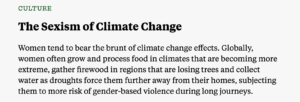The Sexism of Climate Change
Women tend to bear the brunt of climate change effects. Globally, women often grow and process food in climates that are becoming more extreme, gather firewood in regions that are losing trees and collect water as droughts force them further away from their homes, subjecting them to more risk of gender-based violence during long journeys.
Despite their heightened vulnerability, few women make decisions about climate change on the world stage. Men make up more than 90 percent of the heads of governments and companies around the world.
That is why, for International Women’s Month this year, UN Women’s HeForShe Initiative is focused on gender equality and sustainability, particularly regarding climate change. The initiative, which started in 2015, is a movement that aims to empower men and boys to be advocates for gender equality.
“The top managers of the corporations that are responsible for emissions operate in … a highly competitive and power-oriented masculinity and are answerable to boards and shareholders who want to see a return on investment. Heads of government are operating in an environment with a clear objective of protecting the economic and political interests of their countries with regards to climate change,” wrote Edward Wageni, global head of the HeForShe Initiative in an editorial this month. “In the process they formulate policies that deepen gender inequalities and harm the environment further.”
#
The spokesman for a feminist-based environmental group at UN climate summit, accused men of being the biggest contributors to human-caused “global warming” and lamented that women are bearing the brunt of the negative climate consequences created by men. “Women and men are differently affected by climate change and they contribute differently to climate change,” said Ulrike Rohr, director of the German-based group called “Genanet-Focal point gender, Environment, Sustainability.” Rohr, who is demanding “climate gender justice,” left no doubt as to which gender she believes was the chief culprit in emitting greenhouse gasses.
“To give you an example from Germany, it is mostly men who are going by car. Women are going by public transport mostly,” Rohr told Cybercast News Service. Rohr was standing in front of her booth, which featured a banner calling for “creative gender strategies” from “rural households to global scientific bodies.” “In most parts of the world, women are contributing less [to greenhouse gasses],” Rohr continued. But it is the women of the world who will feel the most heat from catastrophic global warming, she said. “At least in the developing countries, it is women who are more affected because they are more vulnerable, so they don’t have access to money to go outside the country or go somewhere else to earn money and they have to care for their families,” she said.
Dr. Aaron Brough of Utah State University is trying to get to the bottom of through his research. Brough co-authored a paper with professors from four other universities to understand how gender norms affect sustainable decision making. They report data from seven experiments that included over 2,000 participants from the US and China. What they found was remarkable.
They found that both men and women associated doing something good for the environment with being “more feminine.” And when men’s gender identity was threatened, they tried to reassert their masculinity through environmentally damaging choices. The report states that “men may be motivated to avoid or even oppose green behaviors in order to safeguard their gender identity.” This unearths a deeply held unconscious bias that Brough and team call the “Green-Feminine Stereotype.” …
Exposing the fact that our society creates a toxic hierarchy around femininity as a lesser thing. Brough himself cited gender research around “gender incongruence” and the great penalties that men (and women) face when they don’t fit stereotypical gender norms.
#
Watch: Mark Steyn reacts: Steyn said. “If I understand this thesis, my insecurities about my masculinity are causing rising sea levels in the Maldives. And at first I didn’t really buy that, but as I think about it, I think in fact it’s actually one of the least risible climate science thesis of recent years.





